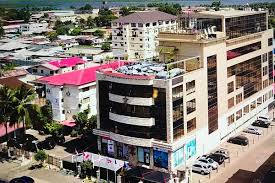Liberia’s flood-ravaged capital will be moved to another part of the country if its senators have their way with a proposal to that effect.
Liberia became independent in 1847.
Monrovia is the capital and most important city in Africa’s oldest republic founded by the United States as a settlement of freed slaves in 1821.
The cape was declared the nation’s capital three years later and has served that purpose for 200 years.
However, senators apparently concerned about the vulnerability of the area to flashfloods in recent years have sent a proposal to the government for the building of a new capital comparatively safer from the ravages of climate change.
Earlier this month, the lawmakers debated the details of a report by the joint committee on Public Works and Rural Development, Lands, Mines and Energy, Natural Resources and Environment and Public Corporations.
They had expressed concern that people in their constituents have been consistently affected by flooding every rainy season in their living memory and urged action to be taken to not only mitigate the effects of this adverse situation but also measures to minismise the deaths and devastation such natural phenomena leave in their wake.
In recent times Monrovia, a city on the Atlantic Ocean coastline has been in the throes of inclement weather patterns, culminating in floods that have devasted the lives and property of over 50,000 residents.
The senator’s proposal which is being studied by the Liberian ministry of works explains that moving away from Monrovia will ease the pressure on the infrastructure of this city of 2.2 million people, representing 33.5 percent of the country’s 5.5 million inhabitants, according to a 2022 census.
One proponent of the proposal is Senator Dabah Varpilah of Grand Cape Mount County who impressed on her peers that the notion of building a new city is imperative although it was ”not going to happen overnight even if we find oil today in Liberia”.
She described Monrovia as ”overpopulated, dilapidated and has reached a point that renovation cannot work”.
No area for the proposed new capital has been identified.
It was noticed that sea levels have been rising steadily since 2013 and blamed as the main factor for the floods especially in Monrovian slums such as West Point where thousands of homes were destroyed by surging waters and close to 10, 000 people rendered homeless as a result.
Areas particularly vulnerable are settlements with poor drainage and steep terrains where tropical storms and hurricanes leave residents vulnerable every year without the means to tackle the challenges posed by resultant floods.
This rise has not spared the shores along Greater Monrovia District where a 2021 World Bank report gloomily projected that sea levels will reach 16 cm by 2030.
The idea of moving the capital away from Monrovia was first mooted in 2012 but no action followed ex president Ellen Johnson Sirleaf’s pronouncements about constructing it in Zekepa, Nimba County.
It is not the first time that capital cities in Africa have been moved from their original locations.
Abuja toppled Lagos as Nigeria’s federal capital in 1991 while Dodoma replaced Dar es Salaam as Tanzania’s capital in 1996.
WN/as/APA


